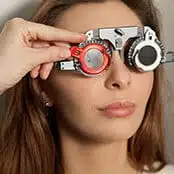
If you have received a diagnosis of diabetes, whether type1 or 2, you know you are at higher risk for developing problems with your crucial organs and body parts, such as the heart, blood vessels, kidneys, feet, etc., than someone without it. One such crucial organ is your eyes.
Constant high blood sugar in diabetic patients damages the tiny blood vessels that supply your eyes, causing a wide range of problems, including diabetic retinopathy, macular degeneration, and other retinal disorders.
Thankfully, there are some ways by which you can take care of your eyes, particularly if you have diabetes. You can also receive medical care from an ophthalmologist for your eye diseases resulting from diabetes.
Let’s learn more about this and where you can go for outstanding eye care in Washington.
Eye Care for Diabetes
If you have diabetes, you may not know that the high blood sugar level damages your eyes until the damage is bad. So, as soon as you receive a diagnosis of diabetes, be proactive about the health of your eyes.
Following are some of the ways by which you can care for your eyes if you have diabetes.
Regular Eye Exam
A regular, possibly annual, or biannual, eye exam from an eye doctor (ophthalmologist) is crucial to ensure good eye health in diabetes. Eye exams allow ophthalmologists to find eye problems early and do necessary interventions to prevent the problems from getting worse.
For an eye exam, your ophthalmologist dilates your eyes for a good view of the entire retina (back part of the eye). They may also use digital retinal photography to examine your eyes.
Manage Your Blood Sugar Level
One of the best things that you can do for your body with diabetes is to keep your blood sugar level under control (at normal or near normal levels).
Regularly check your blood sugar level and aim to keep it under control by modifying your diet and lifestyle andtaking medications.
Manage Your Blood Pressure
High blood pressure, along with diabetes, can also damage the blood vessels of your eyes. Therefore, it is highly recommended for people with diabetes to keep their blood pressure less than 140/90.
So, have your blood pressure checked often and take your blood pressure medications if you need them to control your BP.
Control Your Blood Cholesterol Level
Abnormal cholesterol levels can also contribute to eye diseases such as diabetic retinopathy. So, keep your blood cholesterol level in the normal range.
Watch Out for Warning Signs
It’s a good idea to learn about eye diseasesthat you may contract due to diabetes. Signs of diabetic diseases that you should watch out for include:
- Double, cloudy, or blurry vision
- Flashing lights
- Pain, pressure, or constant redness in the eyes
- Dark, blank, or floating spots in the eyes
- Trouble seeing straight lines or seeing out of the corner of your eyes
- Sudden change in the vision
Diabetic Eye Disease Treatment
Diabetic eye diseases are much more common than you think. About one in three diabetic patients above the age of 40 years have some signs of diabetic neuropathy, while glaucoma and cataract are also very common in diabetics.
Thankfully, many treatment options are available for diabetic eye diseases, including medicine, laser treatments, surgery, or a combination of these options.
- Medicines for diabetic eye disease, namely anti-VEGF (vascular endothelial growth factors), work by blocking the growth of the abnormal blood vessels in the eyes, stopping the fluid leaks, thereby helping treat diabetic macular edema.
- Laser treatment has shown proven results in treating diabetic retinopathy. Laser beams destroy or seal the abnormal vessels, thereby not only treating eye disease but also lowering the risk of future vision loss.
- Surgery is mainly done in more advanced cases of retinopathy, in cataracts, and when there is bleeding in the vitreous.
Your ophthalmologist will consider your eye disease severity, blood sugar levels, and other important aspects before recommending a treatment option.
Eye Doctor for Diabetes in Washington
If you have diabetes and want to protect your eyes, visit us at Advanced Sight Center. Our ophthalmologists are committed to providing comprehensive and leading care,includingan eye exam, cataract surgery, and diagnosis and treatment of eye diseases, such as diabetic retinopathy, macular degeneration, glaucoma, and other corneal disorders.
If you would like to request an appointment with one of our ophthalmologists or optometrist, use our online form or call us today at (636) 239-1650.




